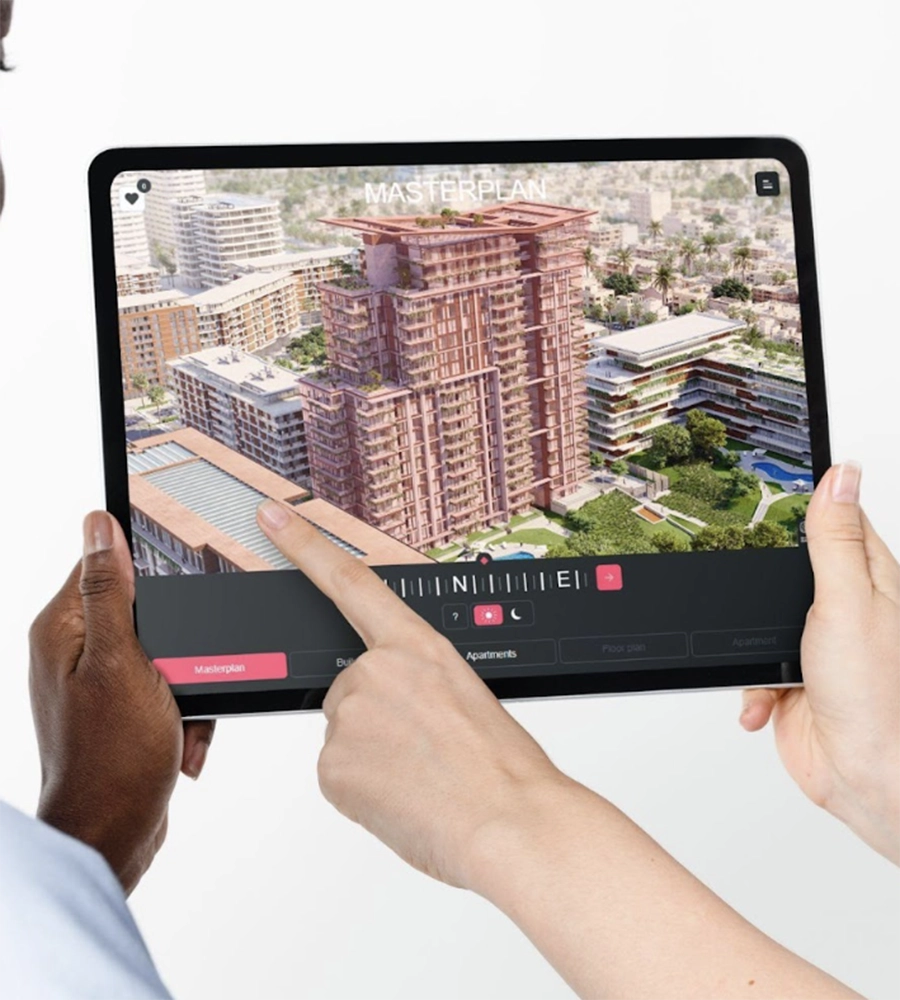Real estate technology is an umbrella term that encompasses a range of emerging technologies, from property management software to smart home devices and the many devices enabled by the Internet of Things, or IoT. What these technologies have in common is that they simplify property searches, transactions, property management, and customer service.
Modern real estate augmented reality offers several key benefits that are available to a wide range of users, including property owners, investors, and landlords. For example, landlords are increasingly using virtual reality technology to provide potential tenants with virtual tours:
- This allows multiple interested parties to view each property unit, and those interested parties who want or apply to view units in person undergo a basic background check;
- Potential buyers also benefit from being able to view properties they are interested in virtually from the comfort of their own homes, thus reducing travel costs and time between properties. This is a win-win for both parties, both sellers and buyers of real estate.
Real estate technology has evolved rapidly over the past decade, and many subsets of real estate technology have emerged, from prop-tech tools to cloud-based software. In today’s article, we explore the different impacts of real estate technology on different sectors of the industry.
Real estate development
An area ripe for transformation is real estate development, for example in new construction projects or repositioning buildings through value creation strategies. Many builders still use simple Excel spreadsheets to find deals, guarantee construction projects, and track budgets—a process that leaves the data vulnerable to user error. Most of today’s construction companies are trying to enter this digital dynamic space at an early stage, because modern real estate development technologies significantly simplify various real estate transactions, eliminating errors and saving a lot of time. For buyers exploring available homes in Carlsbad CA, digital platforms enable streamlined searches and faster decision-making. These tools improve access to information and create a more transparent process.
How has real estate technology changed?
As mentioned above, real estate development has yet to experience the same massive disruption as other industries. Of course, there are some notable exceptions. Augmented reality (AR) and virtual reality (VR) experiences are still evolving, but simplifying property viewing makes it easier for architects and engineers to model what a building project will look like when it’s finally finished.
The turbulent market of construction technologies allows developers to save money. Outdated methods of managing real estate transactions are a long and expensive process. The current technology trend in the real estate industry is towards more integrated construction projects with Building Information Modeling (BIM), which is a digital representation of the physical and functional aspects of the building being designed. BIM is essentially a shared knowledge platform that enables better real-time decision-making throughout the life cycle of a construction project.
BIM allows team members to perform various simulations (eg construction, design changes, energy consumption) and avoid losing valuable information. It can be used at the end of a project to facilitate repair and maintenance. By using BIM software, real estate developers can reduce waste, control costs, coordinate workflows, and optimize workloads. More and more developers want to integrate BIM programs with other software to reduce the need for expensive construction materials and labor.
Such tools, especially when integrated into optimal programs, include capital expenditures, construction schedules, etc. This will be very useful for developers who want to achieve better control, for example, it ensures that all parties involved in the transaction (project sponsors, architects, designers, lenders, asset managers, etc.) are moving in the same direction with the same data.
Asset management
Real estate management is an area that has been significantly impacted by technology. Hardware and software have revolutionized property management. Consider, for example, the range of hardware available to property managers today. Smart home devices can be controlled remotely. This means that the owner can adjust the temperature in the living space accordingly, and also allows utility lines to be connected when contractors need to be on-site to carry out work. Water leaks can be monitored using smart water meters. For example, if the device uses water between 1:00 a.m. and 5:00 a.m., this may indicate a water leak. The property manager will be notified immediately and will be able to investigate the issue. Hardware sensors like these help reduce costs and increase net operating profit, ultimately multiplying the value of the property.
Let’s see how, with the help of new technologies, it is possible to implement a proportional system of payment for utility services. For those premises where water is not individually metered, the owner receives a bill, which can then be prorated. Property management software can calculate the cost of an apartment’s utilities using different algorithms, such as based on the square footage of the apartment, the number of bedrooms, or the number of tenants living in the apartment. The software automatically takes into account, for example, the available space calculates the amount to be paid per unit, and then bills the tenants for the use of utilities. Such software not only saves time but also prevents possible human errors.
Some property management systems have built-in features that allow you to text landlords when rent is overdue or email all tenants with an important notification, such as a planned power outage to upgrade some equipment. Tenants appreciate this communication (and you can easily opt out of automatic notifications if you wish).
How has real estate technology changed?
Management is a highly segmented field. Most property management companies are family businesses, so they have been in business for decades. Property management companies have only recently begun to integrate technology into their operations. This reduced the need for manual entry of repair and maintenance requests, handwritten work notes, and repetitive rental requests. Property management companies are bringing these processes into the digital world. And for good reason.
People who use modern technologies in the field of real estate management can better manage their assets. The owner can easily retrieve reports from the system as needed and share this data with others, including lenders, investors, and contractors. Landlords can track communications between property managers and their tenants to identify opportunities for improvement: for example, a landlord can see how quickly a property manager responds to service requests or landlord concerns about things like property amenities or potential rent. Traditionally, landlords have relied on property managers to provide this information. Owners can now have this updated real-time information at their fingertips.
Real estate sales and modern technologies
Commercial real estate has historically been a little-known sector. Unlike traditional free markets, buyers do not have access to the same information. Anyone who has access to certain information has an advantage over their competitors. This is where real estate technology has a big impact. Modern programs collect reliable data for users from the public and private sectors. This facilitates the identification of potential buyers and sellers, as well as the search for partners or investors interested in a commercial real estate transaction:
- However, having data is not enough. Sponsors need to be able to analyze them carefully to have an edge over their potential competitors. Shortly, artificial intelligence (AI) will play an important role in this field. Investors nowadays actively use various software tools to analyze the markets every quarter. It is important to carefully monitor specific trends in these areas, such as employment and population growth. A key goal is to stay one step ahead and use data to identify competitive opportunities;
- Modern software allows you to create your own underwriting and valuation models. You can then use this data to verify transactions. For example, you can easily see what will happen if the market rent drops by X amount. You can check lenders’ interest rates to see how that will affect transactions. Such a model allows you to determine how a particular asset is performing in a particular market based on a set of criteria so that you can make more informed decisions about potential real estate buying or selling opportunities;
- There is a misconception that the role of the real estate agent is diminishing. This is not the case, at least when it comes to commercial real estate. Even though real estate and market data is available online, it is still important to contact agents. Brokers typically have access to the best OTC deals and can help investors cast the widest net when they are ready to sell a property;
- Therefore, building relationships with these brokers is more important than ever. To strengthen their authority in the market, real estate agents pay more attention to their presence on the Internet. They use specialized commercial real estate photography and video, virtual tours, SEO, and reputation management software to promote their business.
Real estate marketing and modern technologies
In recent years, real estate marketing has changed dramatically, mainly due to the rapid progress of modern technologies. From marketing to property maintenance and more, property owners and managers are increasingly using high-tech software applications that integrate all the data they need. For example, some real estate management platforms go so far as to integrate listings that promote residential properties. We can see who is seeing your ads and then follow up and take customer action as needed. With the same system, we can even accept rental applications, sign leases electronically, and then accept online payments. Of course, this type of marketing requires training, but in the end, it makes each task more effective in its execution.
Today, people who are looking for an apartment or house to rent or buy often look at newspaper ads or read a real estate guide in their area. They use websites like Google, Craigslist, Facebook, Zillow, and Apartments.com to find apartments that meet their criteria. The apartment rental model has completely changed, and this is perhaps the area where real estate technology has had the biggest impact.
This development means that digital marketing is more important than ever for landlords. Digital advertising is a way for businesses to get value for their money.
This applies both to the rental of separate premises and to the sale of an entire building to investors. Recent changes in SEC rules mean it’s easier for holders to make offers to the broader market. We are seeing more and more people using social media, crowdfunding platforms, and other digital tools to generate interest in their offerings. Now you don’t need to develop a personal relationship with these people. Real estate can now be sold to accredited and non-accredited investors. Web conferencing tools such as Zoom are often used to communicate with investors without the need to meet in person. This change has been dramatic and will continue to develop at a rapid pace.
Summarizing all of the above
Modern technologies are becoming increasingly important in the real estate sector. Many believed that software could not fundamentally change the way real estate, physical, and complex assets such as residential buildings or other commercial properties were managed. But in fact, the phenomenon is quite the opposite: technology has the potential to change almost every aspect of the commercial real estate industry because the way we do business is about attracting investors to the properties we manage and ultimately sell.
As technology continues to advance at such a rapid pace, it remains to be seen how hardware and software will impact the commercial real estate industry. But one thing is certain: it will happen, and in many ways, it will change the way real estate transactions are currently conducted. Those who are willing to adopt new technologies will soon surpass their competitors who do not want to use the possibilities of modern innovative solutions.
Image Source: https://visengine.com/







